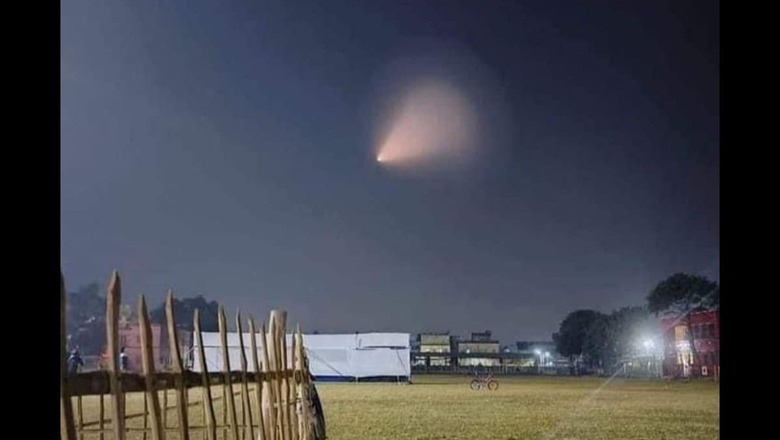
views
A mysterious light in the sky, which was spotted for around five minutes over several parts of West Bengal, including Kolkata, on Thursday gave rise to speculations regarding the sighting of an alien ship. The light was visible in Bishnupur, Kirnahar, Ghatal, and Murshidabad at around 5.47pm and moved like a spotlight, several residents as well as social media users pointed out.
While many speculated that the light could be from a UFO or a meteor, some on Twitter pointed out that the sight coincided with the night trial of the nuclear-capable Agni-V ballistic missile off the APJ Abdul Kalam Island in Odisha.
India on Thursday successfully test fired nuclear-capable Agni-V ballistic missile having a range of over 5,000 km, marking a significant boost to the country’s strategic deterrence. The test-firing came amid India’s lingering border row with China.
The evening sky suddenly brightens up with a moving torch like source of light on southern sky approx 45 degree from horizon on 15Dec 2022, stays between 545pm and 550pm near Kolkata before the torch turns off. #meteor? #sky #kolkata pic.twitter.com/sPgHwShNGy
— Subhamoy Chakraborti (@csubhamoy) December 15, 2022
Mysterious light seen from various parts of south Bengal earlier this eveningLasted about two minutes
Any idea what this is? pic.twitter.com/TvEiDPilk3
— Agnivo Niyogi (অগ্নিভ নিয়োগী) (@Aagan86) December 15, 2022
Mysterious light visible in the sky in Dhanbad ( a city in jharkhand state of India ) Can you please explain this @NASAHubble @NASA @isro @SpaceX @elonmusk @rnuddkranchi @PMOIndia @MIB_India @RanchiPIB pic.twitter.com/1bYcUFLsdD
— Mohit Kumar (@Mohiiitkumar) December 15, 2022
On November 9, troops of India and China clashed in the Tawang sector of Arunachal Pradesh, resulting in minor injuries to some soldiers on both sides. Ties between both the countries nosedived significantly following the fierce clash in the Galwan Valley in June 2020 that marked the most serious military conflict between the two sides in decades. Both sides gradually enhanced their deployment by rushing in tens of thousands of soldiers and heavy weaponry. Following the eastern Ladakh standoff, the Indian Army significantly bolstered its operational capabilities along the LAC in the eastern theatre.
The nuclear-capable missile can carry a warhead weighing around 1,500 kg and has a launch weight of 50,000 kg, making it one of the country’s most powerful missiles.
According to the Nuclear Threat Initiative (NTI), India has the “capacity to deploy short-, medium-, and long-range ballistic missiles”. It says that the country “views its nuclear weapons and long-range power projection programmes as the key to maintaining strategic stability in the Asia-Pacific region”.
It lists the Prithvi-II, Agni-I, Agni-II, Agni-III, and Agni-IV as “India’s fully operational land-based ballistic missiles”, noting that the country also has submarine launched ballistic missiles (SLBMs).
Arms Control Association, another US-based organisation, says that ballistic missiles are “powered by rockets initially but then they follow an unpowered, free-falling trajectory towards their targets”. It notes that as of December 2017, there were 31 countries that had such missiles with only nine among them known or suspected to possess nuclear capabilities — China, France, India, Israel, North Korea, Pakistan, Russia, UK, US.
Read all the Latest India News here




















Comments
0 comment